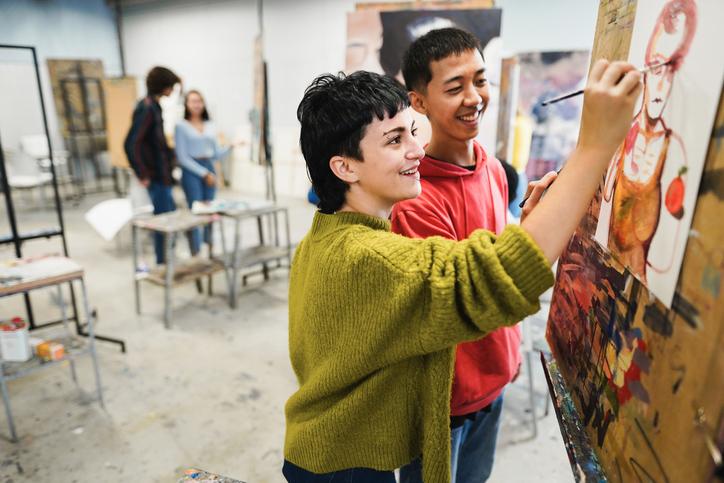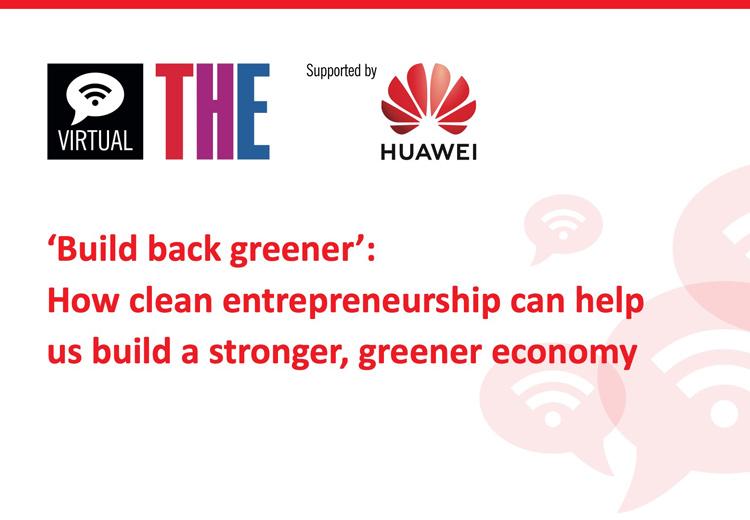
How to foster a start-up mindset in creative sector students
In an ever-changing employment landscape, more students than ever are setting up start-ups after graduation. Richard Sant and Victoria Fabbri share how the creative sector has lessons for nurturing future entrepreneurs
You may also like
Popular resources
Student start-ups are growing faster than company foundations across the wider economy in the UK. The creative sector is characterised by start-ups and small enterprises and at the University of the Arts London (UAL), many of our graduates will either create their own companies or go on to become business leaders. Recent data published by the Higher Education Statistics Agency (Hesa) shows that out of a record number of student start-up companies created at UK universities, students at UAL formed 431 start-ups between 2021-22, topping the list. In fact, the first three universities on Hesa’s list all have an arts focus.
This gives us a real indicator of the integral link between creativity and innovation in entrepreneurship and the success of nurturing a start-up mindset at university level that can be applied across all types of higher education institutions.
- Resource collection: What innovation needs to thrive in higher education
- Career mentoring can support student employability
- Bad news, kids (and academics): the magical motivation fairy doesn’t exist
So, how as a university can we foster beliefs and attitudes so our students approach challenges, opportunities and their future careers with a start-up mindset?
Tap into students’ intrinsic motivation
When we talk about a start-up mindset, we are drawing on literature and ideas from psychology. While it doesn’t need to be explicit in the language used around enterprise education, applying the principles of positive psychology provides the ideal foundations for shaping this mindset.
First, it is important to tap into a student’s intrinsic motivation – defined as “the motivation to work on something because it is interesting, involving, exciting, satisfying, or personally challenging”. This is the opposite of being extrinsically motivated (for example, by an exam or a salary). The strapline in our department – “Make a living doing what you love” – speaks directly to our students’ intrinsic motivation. It’s about using entrepreneurship to channel students’ intrinsic motivators.
Build students’ sense of self-efficacy
Once we have identified this intrinsic motivation, another integral principle from positive psychology is building a student’s sense of self-efficacy. Championed by Albert Bandura, self-efficacy theory emphasises the importance of the individual and their perceptions of their personal capabilities as key determinants of successful outcomes. In short, belief in your ability to achieve something can enable or hinder your success. To foster a start-up mindset, it is crucial that we help build a greater sense of belief in our students’ ability to develop a start-up and achieve success in doing so.
One way to do this is to help students recognise their start-up-aligned abilities within the context of their curriculum via three key capabilities. First, by realising their projects, a creative individual draws on enterprise, agility and proactivity to make things happen. Second, by being in the business of developing and sharing ideas, a creative individual will connect, showcase and develop compelling narratives. Finally, operating through ambiguity will help a creative individual develop the resilience, self-efficacy and curiosity to navigate change.
At UAL, we use the Creative Attributes Framework to do this. Through the framework it is encouraging to see how these attributes align with those associated with entrepreneurship and leadership. By articulating this, students can begin to develop a robust sense of self-efficacy and readily identify with this start-up mindset.
Design mastery experiences
Bandura argues that the most effective way to build self-efficacy is through “mastery experiences”. These experiences let students set a goal, persist through challenges and achieve satisfying results. Throughout a student’s time at university, we can provide opportunities for these mastery experiences. A journey of mastery experiences through experiential learning and access to opportunities within industry provide students with authentic evidence of their start-up mindset and opportunities to build on their belief in their ability to succeed as business leaders.
Practical ways to encourage students’ entrepreneurial thinking
Here are tangible ways we can empower students to foster a start-up mindset:
- Offer programmes that allow students to gain hands-on work experience within a start-up business environment, making sure to address the barriers that students from under-represented backgrounds might face. At UAL, our Enterprise Experience Programme matches students who would otherwise be unable to take unpaid opportunities with paid work experience in a business started by UAL alumni. Students and graduates from across UAL can apply to have work considered for sale in our public-facing shop, providing many with their first experience of working with a retailer. Proceeds are reinvested into our enterprise programme, which supports UAL students and graduates with their businesses.
- Provide mentorship and financial support to get enterprising projects off the ground. UAL’s start-up funding programme provides a platform to pitch students’ ideas, and get feedback from industry experts and start-up funds and/or support through mentoring and training in their first steps.
- Use incubators and accelerator programmes to allow graduates to develop their early-stage business. For example, our Creative Business Accelerator provides selected UAL graduates with workshops with industry professionals and peer-to-peer mentoring to support selected UAL graduates in taking their business to the next stage, while our 10-week UAL Incubator: Launch offers a subsidised studio and work space with access to state-of-the-art making facilities to start-ups.
- Encourage networks for students and graduates to connect, collaborate and share advice and opportunities. Our Enterprising Alumni Association organises activities and events to connect creative leaders who have graduated from UAL, providing opportunities for knowledge-sharing, support and inspiration.
A start-up mindset is fostered in students throughout their university experience and can be nurtured in a variety of ways. With this support, the future of start-ups lies in students who can harness their university experience and find innovative solutions to the world’s needs.
Richard Sant is head of careers and employability, and Victoria Fabbri is enterprise and experiential learning lead, both at the University of the Arts London.
If you would like advice and insight from academics and university staff delivered direct to your inbox each week, sign up for the Campus newsletter.





Comments (0)
or in order to add a comment